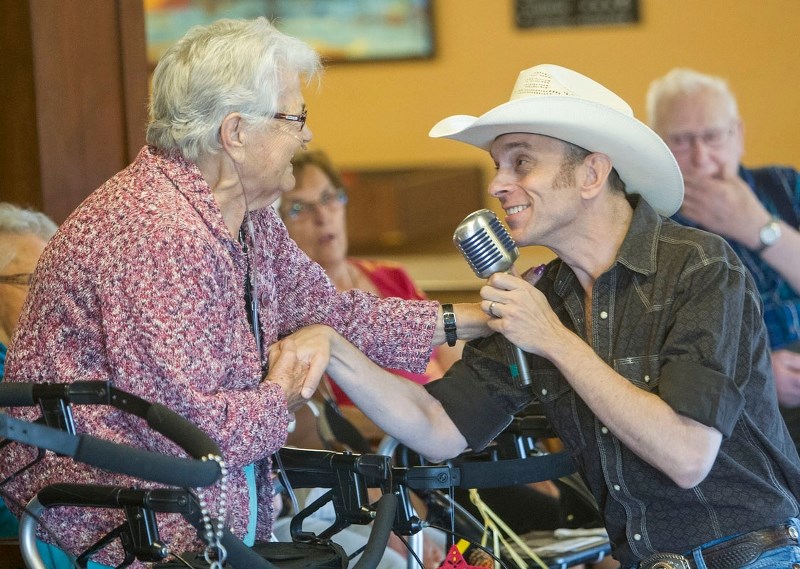A little more than two years ago, Mary, who did not wish to have her last name published, noticed her husband was losing his short-term memory.
The small indications became more apparent – trouble taking care of the family finances, difficulty using the computer and finally running a red light while driving.
Mary mentioned the symptoms to her family doctor. Her husband, 83, was diagnosed with dementia.
"It's not easy. It brings a lot of stress," says Mary.
The couple planned to travel during their retirement, now they can't even hop in the car and drive on a whim. Each suffers loss – loss of freedom, independence, loss of the person you married all those years ago – and it's hard to accept, she says.
"As my husband was losing, I was losing. (Sometimes) you can't keep up."
Two days per week, Mary takes her husband to the adult day support program at the Sturgeon Community Hospital. A much needed respite from caregiving, she says.
The adult day support program operates Tuesday through Friday from 9 a.m. to 3 p.m. Patients are split into two groups – medical rehabilitation and dementia. Patients must be referred by homecare.
Mary's husband attends the rehab program.
Many of the activities are the same between the two groups, but there is a greater focus on the skills the patient has retained in the dementia program, explains Vicky Ryan, day program recreation therapist.
Activities at the day program include arts and crafts, cooking and baking, brain games, pen and paper exercises (to retain writing and arithmetic skills) and exercise – physical activity is one of the most important activities for those with dementia, says Ryan.
One recent addition to the day program has been laughter yoga, run by a certified occupational therapist.
"It's all about the breathing and how you use your diaphragm," says Ryan. "It helps the blood flow, helps the brain. The more you laugh the more endorphins are produced and the better you feel."
Another recent change to dementia-specific programming has been to reminiscence therapy.
Reminiscence therapy
Reminiscence therapy typically involves jogging a person's memory using old photos, objects or music as a prompt. It can be done one-on-one between a dementia patient and health care provider or caregiver, or in a group where people can share their stories.
The technique is popular because it draws on early memories, which dementia patients tend to retain best, states information provided by the Alzheimer's Society UK.
Reminiscing kits, such as the "Kitchen Kit" with old spices and tin cans, are used at the Sturgeon day program, and will soon be provided by the Musée Héritage Museum.
Over at Citadel Care Centre, therapists are starting to use an iPad app called Promenade to help encourage reminiscing and stimulate conversation.
Photos are accompanied with a list of questions, conversation prompts and sometimes background music.
Studies have shown that reminiscence therapy can improve mood and some mental abilities such as memory, states Alzheimer's Society UK. Instead of focusing on their dementia, the patients focus on the nostalgia of the past and reliving memories with their loved ones.
Music therapy
Music can be a very powerful communication tool for people with dementia, says Lori Kary, recreation therapist at Citadel Care Centre and recreation manager with Christenson Communities.
The care centre frequently brings in live performers – Jukebox Leigh is a favourite – and has several music programs including "Sing Along" and "Music Jam" where residents play along with different instruments.
"Music stimulates the brain. It brings back their memory," says Brody Williams, a recreation therapist with Christenson Communities. "It's amazing how many words they can remember throughout one song when they have trouble remembering daily situations."
Music constitutes a large chunk of programming at the Sturgeon day program. This year, attendees will be involved in a drumming circle, handbells and choir. The aim is to put on a Christmas show for families come December, says Ryan.
Music can facilitate cognitive function, shift mood, co-ordinate motor movements and can be used as therapy during all stages of dementia, states the Alzheimer's Foundation of America.
"A person's ability to engage in music, particularly rhythm playing and singing, remains intact late into the disease process," it states, because rhythmic responses require little to no cognitive or mental processing.
The goal of all therapies is to make patients feel good about themselves, says Ryan.
"We try to get them as physically well as we can and independent. Our goal is to keep them in their own home as long as possible," she says.
Outlet for caregivers too
Watching your loved one live with dementia is difficult because you don't know how it will progress, says Mary.
"There isn't anything that tells you … this is going to happen. When you get into these kinds of situations you don't plan ahead because you aren't sure how these things are going to be."
Mary says she is grateful for her two days of respite per week, because it gives her time to get out of the house and focus on something else.
"It saves me. You need to find something good, interesting and enjoyable for yourself."




